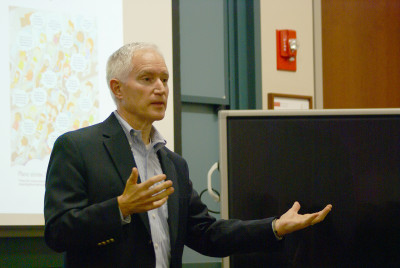
“It’s a heck of a lot of jet fuel,” said Steve Tochilin, the general manager of environmental sustainability at Delta Air Lines, at a conversational presentation Wednesday about the business of keeping airlines sustainable.
In the two-hour program at Boston University’s Questrom School of Business, Tochilin spoke about his business team’s role in “encouraging a work-together culture of sustainability.” Tochilin was visiting as a part of a speaker series for Net Impact, a group of graduate students and business professionals who work to understand business through the lens of sustainability and “responsible management,” their website says.
Wednesday’s gathering, though advertised as a speaker, was largely a dialogue as Tochilin spoke to students about the need for environmental sustainability in airlines, which he referred to as the “white elephant in the room.” Though people know the problem exists, he said, creating an invested interest in fixing the problem is often the most difficult step.
“We aren’t pretending to be the most sustainable mode of transportation,” he said. “We don’t deny that we are an airline. However, we are working to be a more responsible airline and advocate effective sustainability.”
As it stands today, 98.6 percent of Delta’s emissions comes from their airplanes, and the airline uses 4 billion gallons of fuel a year, Tochilin said.
Environmental sustainability has become a more prominent issue in today’s society, Tochilin said, and Delta is trying to shift its marketing focus from “things like peanut quantities and direct flights” to changes that will create a culture that enforces sustainability. This means creating a strong professional base that supports sustainability efforts and making all aspects of the airline industry geared toward sustainability instead of solely revenue creation, he said.
And it also means creating realistic goals.
“The guys working earlier said by 2020 there would be zero emissions,” he said. “We’re here now and that goal isn’t attainable, so we switch to neutral growth.”
In fixing the sustainability problem, Tochilin said his team must maneuver the delicate seesaw that bounces between revenue and sustainability.
For example, Delta recently implemented a 20-minute baggage claim rule that promises customers quicker return time on their luggage. Though the strategy was a successful marketing tool, it ultimately increased the amount of fuel and emissions used by the plane, Tochilin said.
Delta leaders were forced to ask themselves — is it better to make the consumers happy or lessen emissions? Delta prioritized the latter, and went back to their old method of extracting baggage to be more environmentally conscious.
Tochilin said Delta works to understand the possible consequences of a company change by “integrating the financial leadership to understand the costs of doing something and the costs of not doing something.”
Although the airline is still working on their larger projects, such as their owned refineries, it is also focusing on smaller tasks to reach their sustainability goals.
From becoming the first airline to implement in-flight recycling in 2007 to offering customers opportunities to lessen their carbon footprint, Delta’s sustainability branch is constantly looking for more ways to educate and make a difference, Tochilin said.
“It’s the small changes that add up,” said Lacy Clark, a second-year graduate student in Questrom. “I’m encouraged seeing the second generation focusing on how important these issues are, and I think Delta is doing a great job in addressing some relevant problems.”
Beyond working with other leaders at the airline, solving sustainability problems at Delta relies on educating policymakers and consumers to invest themselves in helping fix the problem, Tochilin said.
“We don’t want to just write a report about our sustainability measures and have other people who write reports read it,” Tochilin said. “We don’t want to appeal to just the hardcore environmental people.”
Though Delta leaders said they have a long road to sustainability, Tochilin said his team knows the solution is a work in progress.
“There are certain things that airlines should compete with each other about to get more revenue,” he said. “But one thing they should not complete over is environmental sustainability.


























































































































